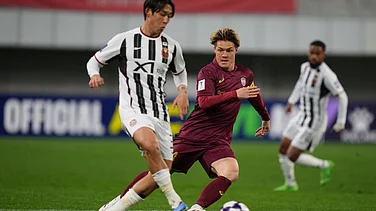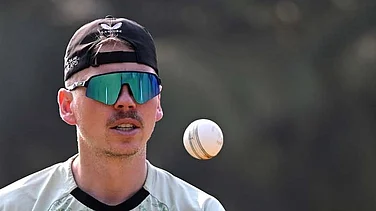In the ’85 Lloyds Bank International Chess championship, Anand defeated leading British chess star Jonathan Mestel in just ten minutes. Overnight, he was world famous as "the lightning kid from India". In ’87, he became the first Asian to become a world champion when he won the world junior title. In ’88, he became the first Indian GM. What I find remarkable is that he had not even played 200 tournament games then.
Anand’s record of first attempt successes was halted only by ex-world champion Anatoly Karpov, who was quite fortunate to defeat him in a very tough match in ’91. However, Anand soon learnt to tackle Karpov and most other players in the world. When he qualified to challenge Kasparov in ’95, the chess world had its hopes pinned on him. However, he was far from his best in the match and had to be content with being world no. 2.
Anand is undoubtedly a most popular chess player. He is level- headed and straightforward with no double standards. Though extremely polite, he still believes in expressing his opinions. His comments on chess politics, though rare, are never discarded by the chess world.
It is interesting to compare the two best players of the day—Garry Kasparov and Vishy Anand. Both started when they were around five years old but Kasparov soon joined the Botvinnik School of Chess run by former world champion Mikhail Botvinnik whereas Anand had to play at home due to lack of chess schools in our country. Both won their very first World Junior championships and became Grandmasters in their teens. Today, they represent different ways of playing. Anand is a genius who prepares little and is generally dependent on his intuition. Kasparov, on the other hand, believes in preparation more and has a great flair for analysing openings. Anand has only one ‘second’ (assistant to help in chess study) and that too for limited purposes whereas Kasparov has hundreds of seconds working for him, analysing openings for him. Both of them are great attacking players. They are systematic in attack and also have great combinative vision. Kasparov’s chief assets are his self-confidence and killer instinct. His shortcoming is his inability to judge the position correctly when he is in a worse-off position. Anand’s assets are his objectivity and quick judgment. His shortcomings are somewhat inadequate opening preparation and an occasional lack of the killer instinct and self-confidence.
Kasparov’s defeat at the hands of his own student Kramnik has not been taken seriously by the chess world. Kramnik has certainly not been considered a world champion at all, despite his victory. The chess world knows that if anyone can displace Kasparov permanently, it is Anand. It is indeed unfortunate that even such a genius has to first overcome the moves outside the chessboard to get an opportunity to be king of the board. After an uncertainty of over eight years, the chess world is now optimistically looking forward to the day they had been hoping for—a single world chess championship under a single banner.
There is a gloomy atmosphere in Indian chess circles due to Anand’s non-inclusion. Anand has always been a source of inspiration to Indian players, even those elder than him, like me. A few days ago the International Chess Federation, FIDE, announced a "unification match" between Kasparov and FIDE players to decide the World Chess Champion for the year 2003. Before looking at what is intended, we must see what’s been happening in the last few years.
Way back in ’93, Kasparov, then world champion, and world No. 2 Nigel Short refused to play under the FIDE banner and played a "world championship" match sponsored by the London Times. Kasparov won the match and declared that he continued to be world champion. With the world champion and his challenger running away from the scene, FIDE had no option but to call then World No. 3 and 4 to play the world championship match, wherein Karpov outclassed Dutch GM Jan Timman.
Though Karpov is a most respected player, the chess world did not actually accept him as champion due to Kasparov’s superior record. Chess enthusiasts from all over made attempts to bring Kasparov back but in vein. He was then in no mood to compromise with FIDE and allegations against each other started. Kasparov even formed a powerful parallel organisation, the Professional Chess Association. The organisation successfully conducted a parallel world championship cycle for the top 64 players in the world and we started having two World Championship cycles. Karpov won the FIDE world title again in ’95 but the chess world was eagerly looking forward to the PCA World Championship between Anand and Kasparov in the later part of the year. Kasparov won this match and continued to be the "uncrowned king of the chess world". Anand later made it clear then that he would no longer play in PCA matches and restricted himself to official world championship cycles of FIDE. Kasparov dissolved his PCA and started choosing his opponents at random, losing his title to Kramnik in a lacklustre match.
Now the FIDE World Championship 2003 has been cancelled in lieu of the "unification process". FIDE has no say in the selection of the participants in the ‘unification’ and the players have been actually selected at random by the sponsors, the Einstein group. The FIDE No. 2, 3 and 4, Vassily Ivanchuk, Viswanathan Anand and Peter Svidler, have been denied entry in the championship, suggesting that the FIDE championship cycle has no recognition in FIDE itself. The International ELO rating list, for which Kasparov doesn’t have a parallel, has also not been used as a merit criterion for the selection.
The chess world recognises four former world champions as the greatest chess geniuses—Paul Murphy of USA in the 19th century who was 100 years ahead of the rest of the world, Jose Raul Capablanca who was considered invincible though he did not even have a chess set at his home, Bobby Fischer who broke the Soviet monopoly singlehandedly, and Vishy Anand, who can give perfect judgment on any chess position in less than a minute. It is indeed fortunate that I had an opportunity of watching a chess genius grow from a young amateur to champion of the world.
(Pravin Thipsay is a GM and a seven-time national champion)


























